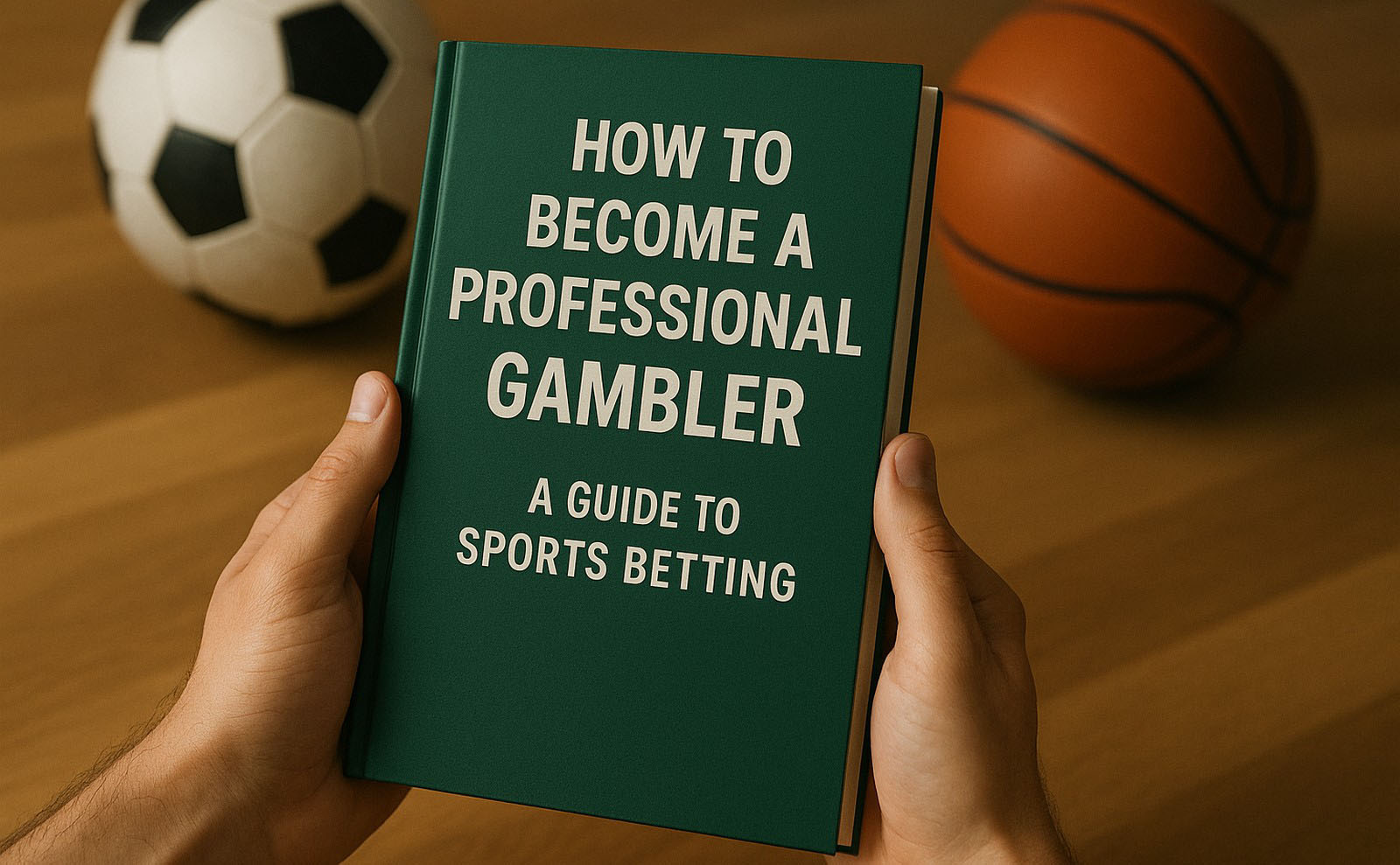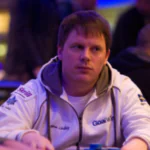How To Become a Professional Gambler: A Guide to Sports Betting


- Fact Checked by: PokerListings
- Last updated on: May 16, 2025 · 10 minutes to read
In the world of sports gambling, there is a line between entertainment and profession. For some, betting is a way to add excitement to watching a match, for others it is a serious and calculated way to get a relatively stable income. Professional betting is not about luck, but about strategy, cold calculation, analytical thinking and iron discipline. In this world, you don’t rely on intuition or luck; instead, you work with numbers, study statistics, analyze lines, and focus on a long-term approach to gain an edge over the bookmaker. Becoming a professional sports gambler means developing a professional mindset focused on consistency, value, and rational decision-making.
This article details how the world of professional betting works: what skills are needed, how to manage a bankroll, what value betting is, how to deal with failure, what the difference is between legal and offshore betting sites, and which sports are the most promising. If you’re wondering how to be a professional sports bettor, this material will be a starting point.
Do You Have What It Takes to Be a Professional Gambler?
Becoming a professional gambler means going beyond casual betting and learning to act as a strategist. But what is a professional gambler in practice? It’s someone who combines desire with a specific set of inner qualities: discipline, analytical mind, patience and emotional stability. Without these fundamentals, any attempt to achieve stability in betting is doomed to failure. The following sections detail specific tools, approaches and knowledge that will help you develop these qualities and begin to move towards professionalism in sports gambling.
Develop the Mindset of a Pro Gambler
A professional bettor approaches wagering like an investor, relying on data and probabilities rather than passion or impulse. They avoid betting on favorites or chasing trends without statistical analysis — instead they gather facts, interpret statistics and seek a measurable edge. Rationality and self-discipline override excitement; every decision is grounded in long-term expectation, not short-term thrill. Pros systematically record each wager, maintain detailed logs of outcomes, assess strategy performance with metrics like ROI and yield, and refine methods based on hard numbers.
They also cultivate emotional resilience, preventing winning or losing streaks from dictating their next move. They focus on expected value rather than isolated successes, understanding that profitability emerges from many small advantages aggregated over time. This mindset shift — from gambling as entertainment to a disciplined enterprise — underpins consistent results.
Manage Your Bankroll Like a Professional
Effective bankroll management is another hallmark of professionals. They allocate capital with a long-term strategy, typically risking only 1–5 % of their total funds on a single event to survive inevitable losing runs. Every wager is logged, tracked and analyzed to measure return on investment and refine staking plans. Betting only what you can afford to lose means treating money as a tool. This transforms your bankroll into a calculated asset rather than a source of stress. By setting clear limits and adhering to them, you minimize the chance of ruin and get a chance of steady growth.
Master Betting Odds and Value Betting
Odds represent probability but include bookmaker margins that reduce your potential returns. Professional sports bettors search for “value bets”, situations where the true likelihood of an outcome exceeds the implied odds, exploiting pricing errors, team underestimations or lineup changes. By calculating expected value and comparing multiple sources, they identify opportunities with a positive edge. Additionally, some specialists use arbitrage by placing offsetting bets across multiple bookmakers to guarantee profit regardless of the result. They often leverage statistical models or specialized software to monitor line movements and detect anomalies before the market corrects. This disciplined research across leagues and bet types builds cumulative profit margins that outpace random variance, giving pros a mathematical advantage over time.
Handle Losses the Way Pros Do
Losses are inevitable, but professionals maintain composure and never chase losses with impulsive bets. They view setbacks as data, not failures, and understand that even sound strategies have losing stretches. Keeping a detailed betting journal lets them analyze mistakes — whether due to poor selection, timing or bankroll missteps — and adjust tactics methodically, never exceeding predefined limits. By focusing on long-term outcomes and evaluating performance metrics like strike rate and drawdown, they navigate downturns calmly and emerge positioned to capitalize on future opportunities. This emotional control — avoiding tilt — ensures their strategies play out without disruption in volatile periods.
Reinvest Your Winnings Wisely
When profits arrive, pros treat them with the same discipline as losses. They avoid emotional spending or inflating stakes prematurely, and base any bankroll increases on sustained success. Typically, they withdraw a portion to diversify into low-risk investments or savings, while retaining enough for future bets.
Conscious reinvestment, guided by clear financial goals and performance data, preserves capital and smooths variance. Over time, this balance between bankroll growth and profit extraction underpins resilient, long-term profitability.
Professional Gambler’s Toolbox: Your Path to Success
Even the most disciplined and analytical bettor will not achieve stable success without the right set of tools. Professional gambling relies not only on experience and strategy, but also on technology that makes betting more accurate and efficient. Tools allow you to analyze markets, find overvalued outcomes, track your own results and make informed decisions. With the right arsenal, a sports bettor moves from chaotic betting to a systematic approach.
A professional player’s tool kit includes:
- Odds comparison platforms such as Oddschecker and SmartBets to help find the most favorable betting lines;
- Programs and applications for data analysis, such as Excel or Python-based tools;
- Ability to use statistical databases and analytics platforms such as Flashscore, WhoScored and Tennis Abstract;
- Value-bet calculators and probability estimators;
- Betting trackers and diaries to keep track of results, including Betting Tracker and Google Sheets;
- Betting exchanges, including platforms like Betfair;
- Services for monitoring lines and tracking odds changes, such as OddsPortal and BetBurger;
- Professional forums and communities to share experiences and strategies.
Popular Sports for Professional Sports Betting

Professional bettors choose sports for online betting depending on experience, knowledge and availability of analytics. Some bet on mass disciplines with plenty of statistics, others find profit in niche markets where bookmakers’ mistakes are more common. The main thing is to understand the chosen sport and be able to work with its data. Popularity is not a decisive factor; what matters more is the depth of analysis and the ability to find winning bets.
Soccer (or european football) is the most popular market among professional punters due to the sheer number of matches, the multitude of betting options and the extensive statistical database. Bookmakers offer lines for almost every game, including the lower divisions, giving you plenty of room to find value bets. Analytics are key: team form, line-ups, motivation, weather conditions — everything matters. A constant stream of news and data allows the attentive punter to stay ahead of the market. It is in football that professionals most often find systematic approaches to profit.
Horse racing attracts professionals due to its rich data history, enabling accurate prediction models. The high volume of bets on major tournaments and regular events offers opportunities for significant winnings. However, the market is complex: not only the form of the horses, but also jockey condition, track and weather matter.
Professional punters study all factors, analyzing statistics and past results. This approach requires knowledge and experience, but those who master prediction can make a steady profit.
Betting on tennis has its own unique characteristics. It is an individual sport where success depends on the fortunes of a single player, making prediction more accurate. Odds can fluctuate quickly depending on the course of the match, opening up opportunities for live betting. The physical and psychological condition of players, their ability to cope with pressure and adapt to the situation on the court, play an important role. Professional bettors often use these moments to make decisions, analyzing not only statistics, but also the current state of the players during the match.
Golf attracts professional players with large tournaments and high odds on winners, creating the opportunity for significant winnings. Unlike team sports, golf is an individual competition where success depends on the form and skills of each player. Professional bettors prefer long term bets, such as predictions on the winners of tournaments or on a player’s position in the overall standings. Successful betting requires in-depth analysis of players, their current form, shot statistics and tournament conditions, including weather and course characteristics.
In addition to traditional sports, there are less obvious but potentially lucrative markets: eSports, baseball, basketball and MMA. These disciplines appeal to professional bettors because of their lower competition and opportunities to find ‘value bets’. For example, in eSports, teams or players are often underrated, giving the chance for favorable bets. In baseball and MMA, statistics, athletes’ physical condition and matchup characteristics are important. Niche markets sometimes offer the best opportunities, as bookmakers do not always accurately assess all game aspects.
Key Professional Gambler Strategies
Professional players use a variety of betting strategies to minimize risk and maximize long-term profits. These methods require a deep understanding of the game, an analytical approach and attention to detail. With the right strategies, bettors can make informed decisions based on facts and data rather than luck.
Best betting strategies of professional players include:
- Flat betting – betting a fixed amount on each event, which allows you to avoid large losses and maintain stability in the game;
- Value betting – finding bets where the bookmaker’s odds are inflated compared to the actual probability of the outcome, which gives a mathematical advantage;
- Arbitrage betting – using the difference in odds at different bookmakers to make a guaranteed profit regardless of the outcome of the sporting event;
- Line tracking – analyzing changes in odds to determine whether a line is overvalued or undervalued, which opens up opportunities for more profitable bets;
- Kelly Criterion – a strategy for calculating the optimal bet size based on the ratio of winning probability to odds, which maximizes bankroll growth while minimizing risk.
Even the most effective strategies require a careful approach at the start. Beginners should try them gradually, in small amounts and with a clear bankroll control. Over time, you can adapt the methods to your experience, thinking style and favorite markets — this is how a personal system is formed, which becomes the foundation of professional growth.
What You Should Know About Gambler Tax
Taxation of winnings from sports betting varies from country to country. In many places, players are liable to pay tax on winnings, which can be levied on large winnings or on any winnings. For example, in the US, taxes are levied on any winnings, while in the UK, sports betting is tax-free.Professional bettors should carefully track their income and keep records of bets and winnings in order to properly account for tax liabilities. It is important to remember that taxes can have a significant impact on profits, and researching your country’s or state’s laws on this subject is a mandatory part of preparation for those planning to work in betting professionally. For a comprehensive understanding of the situation, it is better to contact a local professional for guidance.
Legal and Offshore Bookmakers: What Bettors Need to Know
Choosing the right sportsbook is a foundational decision for any aspiring professional gambler. In the U.S., the market is divided between state-regulated legal sportsbooks and offshore (unlicensed) bookmakers operating outside U.S. jurisdiction. Both options offer advantages and come with significant trade-offs.
- Legal sportsbooks are licensed and regulated by individual state authorities. This ensures strong consumer protection, guaranteed payouts, and secure handling of personal and financial data. One of the main benefits of going legal is clarity on tax obligations—your winnings are reported, and you can stay compliant with the IRS. However, downsides include restricted access (since sportsbooks are only available in legalized states), lower odds due to higher overhead and taxes, and betting limits that can hinder high-volume professionals.
- Offshore bookmakers offer wider availability across the U.S., often better odds, fewer betting restrictions, and broader market coverage, including niche sports and exotic props. These sites attract many pros looking for sharper lines and more flexibility. But they carry significant risks: there’s no legal recourse if disputes arise, no guarantee of payouts, and limited security for deposited funds. Additionally, using offshore books may violate terms of service with U.S. banks or processors, leading to frozen transactions or delayed payments.
If you value security, compliance, and stable long-term betting, legal sportsbooks are your safest bet—especially for professionals building a sustainable career. Offshore sportsbooks, while riskier, may appeal to advanced bettors seeking higher limits or operating in states without legal options.
In either case, understanding the legal landscape and assessing your risk tolerance is essential. Don’t just chase profits.
Comparison Table: Legal vs Offshore Bookmakers
| Feature | Legal Bookmakers | Offshore Bookmakers |
|---|---|---|
| Regulation | Yes | No |
| Tax Reporting | Required | Not enforced |
| Security of Funds | High | Medium to Low |
| Payout Reliability | Guaranteed | Varies |
| Odds | Typically lower | Often higher |
| Availability | Region-restricted | Broad (global access) |
| Betting Limits | Often capped | Usually higher |
| Legal Recourse | Available | Not available |
If stability and legal security matter most (especially for managing large bankrolls) stick with legal bookmakers. If you’re looking for flexibility and sharper odds, offshore options may be viable, but always weigh the risks. Many professionals use both strategically.
Famous Professional Gamblers to Learn From

A lot of professional bettors have achieved success thanks to their unique methods and strategic approach. Their stories show that successful betting on sports is the result of systematic work, analytics and discipline. Many have used math, statistics and psychology to succeed. Here are some famous punters whose methods are worth studying:
- Billy Walters is one of the most famous sports bettors in the US, using complex mathematical models to analyze bets. His ability to predict match results has earned him millions, and his methods remain a subject of study;
- Edward O. Thorpe is a mathematician who created a system for winning at blackjack and later applied his methods to sports betting. He is known for his systematic approach and data analysis;
- Harry Dent is an economist and professional gambler who uses economic and statistical models to predict match results. He argues that success in betting depends on a proper understanding of macroeconomic trends;
- Tony Bloom is a British professional bettor and entrepreneur who got rich from analytical betting strategies. He uses mathematical models and runs one of the largest betting syndicates in the world. He also owns Brighton & Hove Albion Football Club, making him a prominent figure in sports analytics and football;
- Zeljko Ranogajec is an Australian professional gambler known for betting on horse racing and using mathematical models to make a profit.
FAQs About Professional Gambling
What is a professional gambler?
A professional gambler is a person who makes money from betting or other gambling activities by applying analysis and risk management. Unlike an amateur who bets for fun, a professional gambler analyzes data, uses strategies and controls the bankroll to minimize losses and maximize profits.
What makes someone a professional gambler?
A professional gambler is characterized by analytical thinking, discipline and bankroll management. He sees gambling as a business rather than a pastime, seeking a steady income based on calculations and strategies rather than luck.
Should I specialize in one sport to become a professional gambler?
Specializing in one sport offers the advantage of being able to better understand the nuances of the game, statistics and trends, which increases the chances of successful betting. Professionals often choose a narrow focus to become experts and reduce risks from underestimating factors in other sports. However, this limits the possibilities as it requires time and effort to study only one market.
Can I still work and become a professional gambler?
Initially, it is possible to combine work and betting with sufficient self-discipline and the ability to divide time between analysis, betting and work. However, as the career progresses, betting requires more time and attention, which may hinder the combination. The transition to the professional level requires full commitment and concentration.
Should I use a betting exchange as a pro gambler?
Betting exchanges offer advantages for professionals: lower margins, the ability to bet against other players and to find favorable odds. They are especially useful for accurate betting or bypassing the restrictions of traditional bookmakers. They also allow for arbitrage betting and flexible strategies.
Where are professional bettors looking for the best odds?
Professional bettors use scanners and services to monitor lines and find the best odds among bookmakers. These tools help to quickly track changes and find favorable bets. They also use data analysis software to identify underestimated outcomes.
What should I do if I lose my betting bank?
If you have lost the betting bank, it is important not to panic and take a step back. Analyze the mistakes: big bets, lack of strategy or the influence of emotions. Recovery requires discipline: start small, revise your strategy, improve your bankroll management and avoid chasing losses with extra deposits — only bet amounts that won’t hurt your main budget.
Can I make a living from online gambling on sports?
Making money from sports betting is possible, but it requires skill, analysis and time to develop strategies. Professionals work according to a system, strictly controlling bets and bankroll. Success in the long term is possible only with discipline and absence of emotions. It is not a quick path to wealth, but a long and labor-intensive process.
